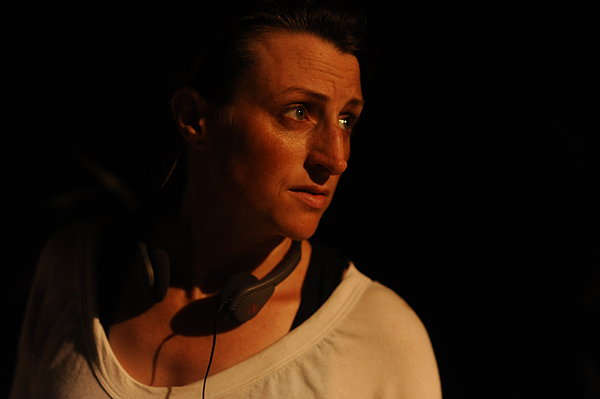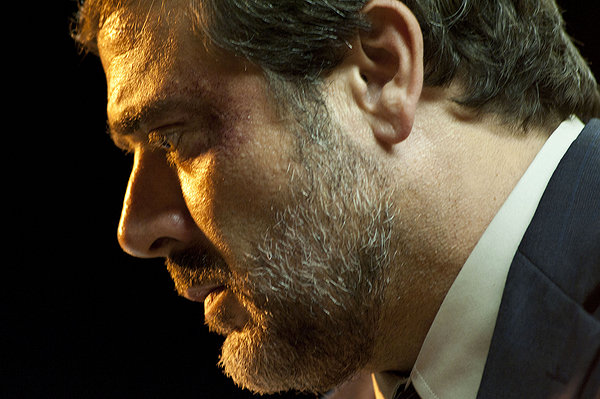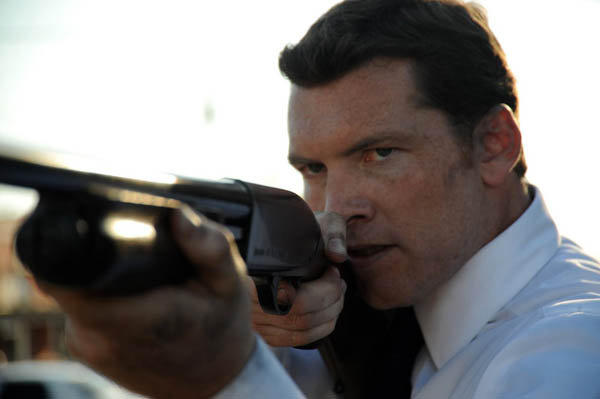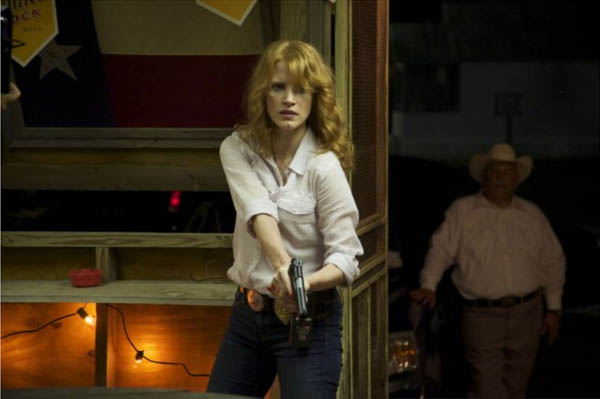Ami Mann and Don Ferrarone on The Texas Killing Fields - find out about the TRUE serial killer story
Ami Mann and Don Ferrarone on The Texas Killing Fields - find out about the TRUE serial killer story
Staci Layne Wilson reporting
The Texas Killing Fields, a show-burn serial killer movie centering on one young girl (played by Chloe Moretz) and her entanglements with the adults in her orbit… some of them well intended but toxic, and some of them just plain evil, this is a much different take than usual on the subject matter. Beyond that, it's based upon true events. Horror.com had the opportunity to catch up with the screenwriter (who was also in law enforcement, working on this case as it unfolded), and the director of the film, a woman who brings her own unique perspective as well as a solid cinematic background as the daughter of filmmaker Michael Mann.
The Texas Killing Fields will be released on DVD on January 31.
Don Ferrarone: I was a police detective sent to Texas help in Galveston on other things that were going on down there. And as I drove down Route 20 I found that there were these posters up all over the place that there were two different girls at the time, whose remains were found and they reconstructed what they look like and nobody's ever identified them. They were asking people, do you know who these girls are? So I came across it when I was down actually working.
Did you ever find a motive? What was the motive was for these killings?
Ami Mann: There are various killers. That's really one of the things that was compelling to me that it wasn't just the simple act because there's been 50 some odd bodies found since 1969. So there are various portrayers’. So it's not like an episode where you have a killer. We find the killer we go to the end of the story is sort of ubiquity to the crimes that I think for me anyway was definitely part of the compulsion to help tell the story and various killers over various decades.
That's really odd that there would be one area in Texas, that they dump bodies.

Don Ferrarone: But it's a very large area. You have a whole bunch of small towns and the towns are safe and just little Texas towns. You would find it any place in Texas, but flowing in between it are these areas that are just deserted. And they're unincorporated. A lot of life has gone on in there, but just 20 miles north is Houston, the city of Houston.
Don, how to go about deciding on essentially focusing on the character of Ann? As Ami and I were talking, the face of these faceless victims...
Don Ferrarone: That's a really good point, because that's really why we're here because that was a big problem that I had initially. As I was talking to other folks about it and Ami said she didn't want to victimize the victims, any more than they already had. Let's say we're talking in a universe of 30 to 50 young ladies. And most of them got identified, but there was still a cluster, a good percentage, who there was nobody to shed a tear for them. There was just nobody who even knew who they were. In society, in sociological terms they’ll call them throw-aways. They were just wandering around and they became targets of these types of killers. So what I did was I actually got to talk to a couple of them and obviously there aren't too many that are alive. A couple had escaped, one was in California, and there are a number of other ones. And I got to talk to one woman who was victimized as a little girl and sexually assaulted by basically the same type of predator and whose daughter, later in life was actually kidnapped and killed. So this lady really opened my eyes. So I did not want to give voice... let me put it this way I wanted to give voice to the kids who had nobody talking for them.
Sorry. Hi Ami. How did you prep such young actors for such dark material?
Ami Mann: I was incredibly fortunate to have the kind of cast and the talent and the people who were willing to go down that road of research with me. So in the case of Jeffrey and Sam and Jessica I went to the LA morgue to look at what it is to be with dead bodies. I took them. I spent some time with the Los Angeles Sheriff's Department looking at some tough stuff. Sexual assault crimes are not a pretty thing to look at, the crime scenes of those. So for every character there is that world for the character of Chloe and Cheryl and James Beyer. There was never mentioned the background, what was meant to be there. Shirley's character is dealing meth, and certainly taking meth and she's also probably prostituting herself. And that's just part of the world that Chloe's character finds herself in, so that research was we went to a safe house for people who were cooking and dealing meth. In Louisiana We spent some time with some women, who they used to be a checkout girl at Target. Just completely sort of all American women, who some of them have children and husbands who had been incarcerated for dealing and Chloe spent some time with them talking to them, I was very lucky. At that time she was 12. So I was very lucky to have somebody so formidable that she was able to be in that environment. Ask amazingly astute questions and take it all in and incorporate it into her performance.

You just mentioned that a lot of back story was implied, but not explicitly stated. Was there a reason why you didn't want that included? Was it just a matter of editing?
Ami Mann: No, not a matter of editing, because the story is inspired by real events, it's not as if we're doing a horror movie or an episode of a TV show. It's not dismissible as an intact piece of narrative, at least in my mind because it's inspired by real events to me, the objective had to be to be as authentic to the world that these events were taking place in and to the people in that world as possible. So, I didn't feel comfortable shooting a scene that had a corpse without understanding what it is to be around a corpse. Directing an actor how you move around the crime scene without actually watching detectives move around a crime scene. So I think that by extension, that means you attempt to be as authentic as possible and respectful as possible in the world as a real world and people who are real people. You just do as much research as you can. Not all of it shows up literally, but hopefully you feel it in the totality of the story.
Now, Don you are friends with two of the original detectives, Mike and Brian. How closely did you work with them or pump them for insight and information that was incorporated into the script?
Don Ferrarone: I actually wrote a good portion of the script right inside their squad room. I went out with them frequently. It's interesting because Mike and Brian are you've seen it 1 million times on TV. Good cop and a bad cop, but I didn't go look for them. They are that way. They came to me. Mike is a blunt instrument. He knows no other way to be a cop, but he'll give you a knuckle sandwich first and talk to you afterwards, where Brian is exactly the opposite. And what attracted me to Brian was Brian dropped all of his emotional barriers, which is. I did this for 30 years. Basically as the detectives so you don't do that because you become a basket case. Brian had them down all the time. And I had never run across anybody like that. So he was constantly after working the actual crime scene or the murder or even solving it. He was back working with the families trying to help them get operations for kids get kids into school. Get some clothes, get some help for people. So, she had dropped all of those barriers, and there was a lot of friction within the police department over Brian constantly doing that.

Ami Mann: And there's friction I spent some time with them in the city too. Sam and Jeffrey did an incredible job capturing the essence of their character. They really, in fact are that way. I would drive around with Brian in Texas City, and he would pull up his SUV in front of people's houses and people would just walk to the car and confess to stuff. My cousin did this liquor store last week. And he's just like this priest. He's just so open and Mike would just regale me with stories of how he drove someone from California to Texas and he was like I didn't use any handcuffs for this guy and I would say, how come you didn't use any handcuffs. He said well, if I get any trouble I would just go like this and hit the guy in the head to keep them in line. Sam and Jeffrey did an incredible job.
Don Ferrarone: As a matter of fact. It was funny because when Sam came down to work with Mike. We thought okay drive him around and show him the territory, and they went off drinking.
Ami Mann: They went and had some beers.
Don Ferrarone: They went to a bar and that was it. You never saw him till the end of the day. So it's interesting because so many stereotypes are out there. But these are the real guys. I just let it go where ever that took me where ever they took me is where the story went.
In your estimation, do you think the best detectives are the ones who leave the job when they clock out or are the best detectives the ones who actually take it really personal and take their job home?
Don Ferrarone: The classic answer is don't take it home with you. But I found a guy who did. And his wife was involved. She was constantly at Wal-Mart working with the manager, who was giving her close out the back or riding over to a shelter once to talk to some women were some of these girls that were on the run, and there was Brian opening the trunk of his car pulling out all kinds of clothes that he had gotten from people to give to the shelter. So I would say the safest thing if you're going to be a detective for a long period of time is don't take it home with you. But there's a guy out there who does it. It's interesting.
Ami Mann: And the story, I think that's why the crime genre I suppose is one of the most popular genres. I think it serves as a nice metaphor for things that we all experience. Essentially it's, what do we do when we're faced with chaos? Or, what do we do with things that we can't control? So we see detectives literally see the worst things happening and want to make it stop. That's their objective, and they see these things happen to the most innocent and vulnerable people including children in the case of the story. And so, on another level I think what is so brilliant about Don's writing is that it's talking also about two very different approaches to the notion of what we do with the chaos around us. Sam's methodology and Mike's methodology is to draw very distinct lines between what he could control and what he can't control. And sometimes that's what we do, and Brian's methodology is to be completely permeable to have to allow himself to feel everything. And sometimes that's what we do. And I think at the end of the day definitely one of the elements of the story is. I don't know which way is right. Perhaps it depends on the circumstances, but I think that we all of us experience the tension of not knowing how much to allow ourselves to feel. That we must cut ourselves off.

On the same lines, Mike makes a very interesting point in the movie. I keep thinking about it. Jurisdiction about how we have our problems here. How much of that in law enforcement is necessary to keep you from going crazy and where do you draw the line?
Don Ferrarone: It's a really important point. And if you go to the Houston Chronicle Just two Sundays ago, that was a front page article and it was about the killing fields. They didn't call it the killing fields, but they named a leaven of the girls that wear their including these two right here. And there was a guy in jail who confessed but to 11 of the murders and it's been handed from one jurisdiction to another, because again the whole area is what Ami was talking about earlier. And I'm very fascinated with the whole concept of chaos and complexity. The complexity theory, and so inside Texas City, which by the way is surrounded by a moat, an actual moat around the city. Inside Texas City, they had only one or two homicides that they had not cleared. Outside in that other area where they had no jurisdiction and all in amongst the area that is called the killing fields Most of them are unsolved. So that whole concept is not only did I see it then But it's been brought up again and the Houston Chronicle is kind of hammering the police departments right now, including Houston, Galveston County, all the different counties are being called to task. Again, to get their act together and to get at it so it's a very real issue and in this country, you know that's a big thing. We don't have a national police force. We actually in effect in some ways do with the FBI. But what we end up doing is who's got jurisdiction? Once you go outside the corporate limits of these little towns, and it becomes an issue and the bad guys they got in there and mind that in a negative way.
So Don, how satisfied or pleased are you with Ami's choice of actors and also the final result of what she did with the printed word?
Don Ferrarone: I tell you I'm shocked at the level of actors that we got. I really couldn't be happier with the delivery of Mike and Chloe. I mean with the two detectives and the whole thing really. It made me feel good. I wrote this thing 11 to 12 years ago. So it's been going from hand to hand for a long time. Now is any screenwriter happy with his final product? Maybe you can find one. I don't know of any. But I have to tell you that what moved me is tThere were a lot of well-known people that were taking a look at this thing and saying that they wanted to do it. And they would talk to me about it and I would go oh my God this is going to be a bloodbath. And all of a sudden Michael Mann calls up and says “I want you to meet Ami. Do you mind if I tell the story?” I went in loaded for bear. I said "no, this isn't going to happen." I sat down at a table in a little room like this with her and I had my whole story rehearsed. I was going to try to be nice, but when you're in law enforcement, and I worked New York City and all over the world. We say bad stuff to each other to make sure you get the message. And I was prepared to do one of those meetings. Before I could even say what I thought the movie was about, she started telling me her approach. And I remember thinking to myself, “Crap. I just lost my entire argument.” And so I just sat there and she just said ”let's go.” So how that is for a roundabout answer? That's it.

How disheartening, is it for you as a law enforcement person to see an article like that in the Houston Chronicle. And know that still some of these victims. The crimes have still not been solved?
Don Ferrarone: You know it's the one thing that happens in that kind of keeps your morale up. You go from case to case and you think okay I've cleared this up. I'll go to the next one and things will get better and things won't backfill behind me. I've taken care of this let's go to the next and it doesn't happen. Things come back. You've got to get better. So a lot of what's happened in law enforcement over the last 15 years. Especially with DNA in this kind of crime has gotten much much better. But if you can just imagine and all end up here with this. If you can imagine a crime scene that within hours the victim might be covered with actual crabs that come up from the bayous or bugs or at night. Animals coming in, and then rain and then moisture and give it 3, 4, 5 days and all of a sudden you've got no crime scene. So what's happened is parts of law enforcement have gotten better. It's getting harder to do it, but other parts and that's in the area of really good cooperation is still not there. So it is very frustrating.
[end]



